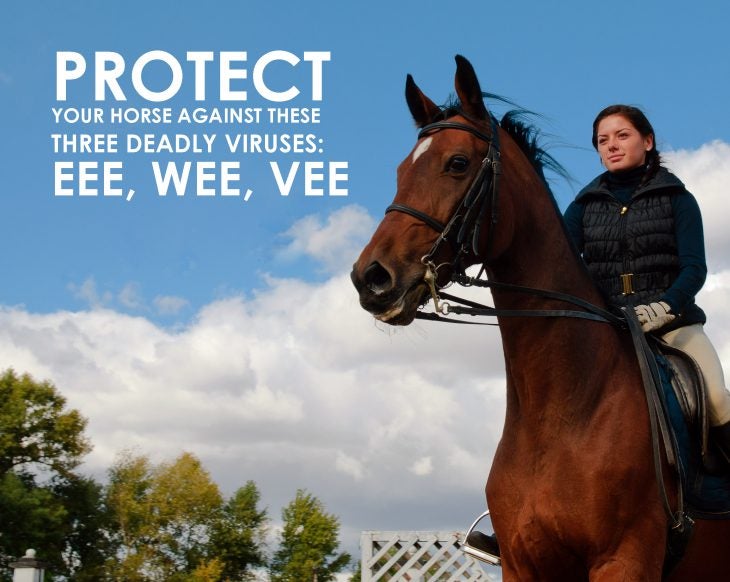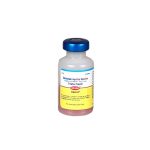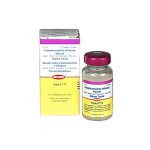Equine Encephalomyelitis viruses are deadly diseases that are transmitted to horses by mosquitoes. Once infected, a horse will experience severe inflammation of the brain which could lead to death.
What symptoms will a horse infected with equine encephalomyelitis display?
Signs of infection include fever, behavioral changes, muscle twitches, not being able to swallow, seizures, and convulsions.
Where does Equine Encephalomyelitis occur?
Equine Encephalomyelitis is categorized by geographical regions. In the United States, Eastern Equine Encephalomyelitis (EEE) is generally found in the eastern, southeastern and some southern states. Horses infected with EEE do not survive. Western Equine Encephalomyelitis (WEE) is typically found in the western and mid-western states. Horses afflicted with WEE have 70 – 80% survival rate. In addition, there is the Venezuelan Equine Encephalomyelitis (VEE) which is common to Central and South America, but cases of VEE have been reported in Mexico and the United States. Horses with VEE have a high mortality rate.*
What can be done to protect a horse against Equine Encephalomyelitis?
The best way to protect a horse against this deadly disease is through reducing and controlling the mosquito population by frequent cleaning of horse stables and trailers, removal of standing water, fumigation against mosquitoes, and establishing a vaccination program.
When should a horse be vaccinated against Equine Encephalomyelitis?
Adult Horses Previously Vaccinated: vaccinations should be given at 4- to 6- month intervals.
Adult Horses Previously Un-vaccinated: a primary series of two doses with a 4- to 6- week interval; revaccinate before the start of the next mosquito season and every year after that.
Pregnant Mares Previously Vaccinated: administer 4- to 6- weeks prior to foaling
Pregnant Mares Previously Un-vaccinated: start a 2-dose primary series with a 4-week interval between doses right away. Administer a booster 4- to 6-weeks prior to foaling or before the start of the next mosquito season (whichever comes first)
Foals of Mares Vaccinated in the Pre-Partum Period: administer a primary 3-dose series starting at 4- to 6-months of age with a 4- to 6-week between the first and second dose. Give the third dose at 10- to 12- months of age before the start of the next mosquito season.
Foals of Mares Not-vaccinated or with no known history of vaccination: begin a primary series of 3 doses within a 4-week interval between the first and second dose. There should be an 8-week interval between the second and third dose. If the series is started during the mosquito season, it is preferred to give the second and third doses at a 3- to 4-week interval.
Naturally infected and recovered horses: Horses that have recovered on their own usually develop lifelong immunity. Should your horse’s immunity status changes, implementing a vaccination program is highly recommended.
Vaccines to help protect your horse against Equine Encephalomyelitis:
Equiloid Innovator vaccine protects against the Eastern and Western equine encephalomyelitis (sleeping sickness) viruses and protection against tetanus. Equiloid Innovator vaccine is administered intramuscularly.
Fluvac Innovator Triple E-FT (3-Way S. Sickness + Tet. + Flu) aids in the prevention of equine encephalomyelitis due to Eastern, Western and Venezuelan viruses, equine influenza due to type A2 viruses, and tetanus. Fluvac Innovator Triple E-FT vaccine is administered intramuscularly.
Prestige V+ WNV with Havlogen protects healthy horses 6 months of age or older. It acts as an aid in the prevention of disease caused by Eastern and Western Encephalomyelitis viruses and Tetanus. In addition this vaccine serves as an aid in the control of respiratory disease caused by EIV, EHV-1 and EHV-4. Prestige V+ WNV is administered intramuscularly.
In summary, Equine Encephalomyelitis is a deadly virus that causes inflammation of the brain in horses. It is passed on to horses by mosquitoes that carry the virus. Symptoms include fever, behavioral changes, muscle twitches, not being able to swallow, seizures, and convulsions. Prevention is the best way to protect horses against Equine Encephalomyelitis. Reducing the mosquito population and vaccinating a horse is the best way to prevent Equine Encephalomyelitis.
*Source: The Center for Food Security & Public Health Iowa State University. Equine Encephalomyelitis. PDF. 2009. https://www.cfsph.iastate.edu/FastFacts/pdfs/easter_wester_venezuelan_equine_encephalomyelitis_F.pdf Accessed on January 16, 2017.








